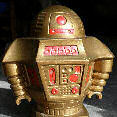 |
Matronics Email Lists
Web Forum Interface to the Matronics Email Lists
|
| View previous topic :: View next topic |
| Author |
Message |
Eric M. Jones

Joined: 10 Jan 2006
Posts: 565
Location: Massachusetts
|
 Posted: Fri Mar 30, 2012 6:16 am Post subject: Antennae materials Posted: Fri Mar 30, 2012 6:16 am Post subject: Antennae materials |
 |
|
First a word on the performance of electronic materials:
We all know that materials have a DC bulk resistivity that is a measure of how they transfer electrons through the material. But for high frequency applications another characteristic is critical: Most dielectric materials are made of molecules with polar configurations— that is, their constituent molecules have shapes where their atoms tend to be non-symmetrically attached. Thus these molecules will twist to try to align with electromagnetic fields imposed on them.
A microwave oven is a good example. Water is somewhat bipolar, and an imposed electromagnetic wave causes the water molecule to change its orientation every cycle, thus producing mechanical heating--and cooking your food. If you were trying to build a PCB for 2.45 GHz, the common household microwave-oven frequency, water, or anything that absorbed water, or anything that was somewhat molecularly-similar to water would be a poor choice.
The materials needed for antennas and PCBs have many structural and environmental constraints (strong enough, reasonably high temperature, no asbestos, waterproof, flame retardant, machinable, etc.) but are critically restrained by the requirement that the molecules making up the material not oscillate much at the frequencies to be used. The molecular shape (to over-simplify), and how well they are locked into the material is the key. This usually limits the commercial material selection to thermosetting materials like phenolic and Bakelite or high-pressure thermosetting resins like epoxies.
When faced with building PCB or antenna supports or other high-frequency electronic parts, many people rely on some very old and august information. Much of this was compiled over half-a-century ago, and while one can appreciate its particular no-nonsense clarity, it misses all the recent advances.
This has many negative affects: Poor material selections drive production prices up and structural dependability down. Time is wasted pursuing arcane “magic materials” invented decades ago and now largely unobtainable—while simple to use, cheap and easily-sourced materials are available.
See:
Good History! Tables of Dielectric Materials. Wright Laboratories, Feb 1944 http://www.dtic.mil/cgi-bin/GetTRDoc?AD=ADA288986
Here is a good and much more recent description of the choice of materials. http://www.speedingedge.com/PDF-Files/tutorial.pdf
The recent discussion of searches for micarta, paper phenolic and Bakelite is a case in point. While these materials had their day, modern designs are almost entirely PCB materials like FR-4, (which almost universally replaced G10 and most other G- and FR- materials).
So that’s the story: Abandon your search for half-century old materials and use FR-4 glass epoxy. MSC Hardware is a great source for machining stock, but if you have a PCB fabricating house nearby, ask to grab some from their dumpster (that’s how I do it).
| | - The Matronics AeroElectric-List Email Forum - | | | Use the List Feature Navigator to browse the many List utilities available such as the Email Subscriptions page, Archive Search & Download, 7-Day Browse, Chat, FAQ, Photoshare, and much more:
http://www.matronics.com/Navigator?AeroElectric-List |
|
_________________
Eric M. Jones
www.PerihelionDesign.com
113 Brentwood Drive
Southbridge, MA 01550
(508) 764-2072
emjones(at)charter.net |
|
| Back to top |
|
 |
nuckolls.bob(at)aeroelect
Guest
|
 Posted: Fri Mar 30, 2012 7:39 am Post subject: Antennae materials Posted: Fri Mar 30, 2012 7:39 am Post subject: Antennae materials |
 |
|
| Quote: |
So that’s the story: Abandon your search for
half-century old materials and use FR-4 glass
epoxy. MSC Hardware is a great source for
machining stock, but if you have a PCB
fabricating house nearby, ask to grab some from
their dumpster (that’s how I do it).
|
Well stated but with one caveat. The dielectric constant
for FR-4 versus the filled phenolic may be different.
Probably is . . . but haven't had time to research/test
it. This was the driving thought for getting my hands
on a production example of the subject antenna. Direct
measurement of the gamma-match capacitor fabricated
from production parts yielded a value of 34 pF.
This becomes the benchmark for substitution of materials.
The choices are many but in this instance, they are not
an apples-for-apples substitution. I'm considering the
use of 1/32" copper clad for fabrication of a similar
antenna. The copper lends itself to soldered joints
(gas tight for centuries). The double-sided cladding
offers an opportunity to craft the gamma-match strut
from a single piece of FR-4 with copper bonded to both
sides.
Just another interesting project for the future . . .
perhaps we can get to it before VOR goes the way
of A-N Range stations.
Bob . . .
| | - The Matronics AeroElectric-List Email Forum - | | | Use the List Feature Navigator to browse the many List utilities available such as the Email Subscriptions page, Archive Search & Download, 7-Day Browse, Chat, FAQ, Photoshare, and much more:
http://www.matronics.com/Navigator?AeroElectric-List |
|
|
|
| Back to top |
|
 |
|
|
You cannot post new topics in this forum
You cannot reply to topics in this forum
You cannot edit your posts in this forum
You cannot delete your posts in this forum
You cannot vote in polls in this forum
You cannot attach files in this forum
You can download files in this forum
|
Powered by phpBB © 2001, 2005 phpBB Group
|


